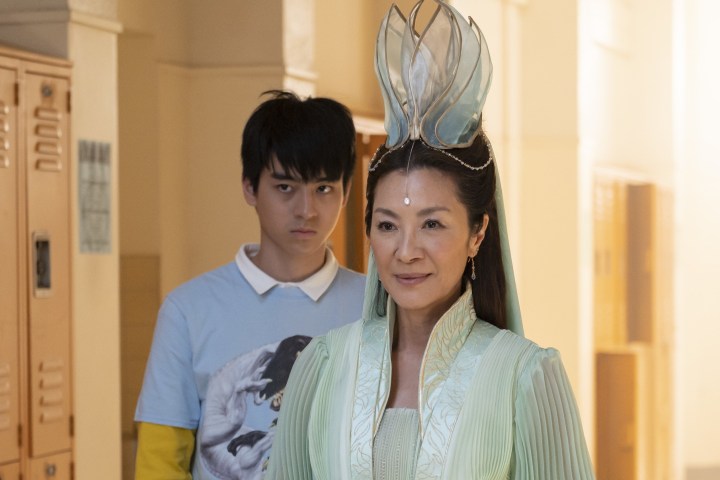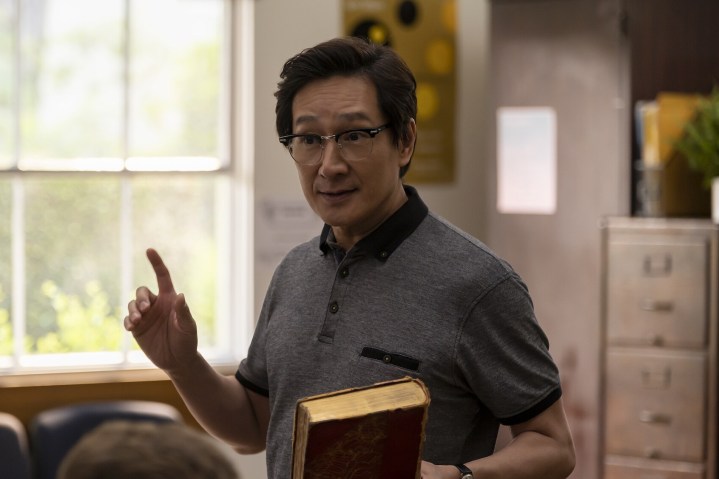“American Born Chinese is a fun, if overly ambitious, cross between a traditional high school-set dramedy and a magical martial arts adventure.”
- A likable cast of characters
- Michelle Yeoh and Ke Huy Quan's scene-stealing supporting performances
- The show's youthful, infectious energy and tone
- Disappointingly uneven direction throughout
- A mythological conflict that doesn't feel as fleshed-out as the show's Earth-based coming-of-age story
American Born Chinese is one of the most promising Disney+ original shows that the streaming service has produced since its launch four years ago. Not only is the series an adaptation of a beloved graphic novel of the same name by Gene Luen Yang, but it also happens to boast a cast that includes, among others, recent Oscar winners Michelle Yeoh and Ke Huy Quan. Several of those stars’ fellow Everything Everywhere All At Once collaborators, including Stephanie Hsu, also pop up at different points throughout American Born Chinese’s eight-episode first season.
On top of its star-studded cast, the series’ martial arts-driven, fantastical coming-of-age story makes it the kind of series that should thrive on a platform like Disney+. You could be forgiven if you didn’t know that American Born Chinese had finally dropped this week, though. You could even be forgiven for not knowing that the series was coming out because Disney+ has released its first eight episodes with little-to-no fanfare, despite the fact that it happens to star two of the world’s most well-liked and recognizable actors.
Why has Disney chosen to handle American Born Chinese’s release in such a lackluster way? It’s impossible to say for certain, but the service’s treatment of the series could reasonably lead one to assume that American Born Chinese is downright bad — so bad that its distributor hasn’t even bothered to try cashing in on the star power of its cast. However, American Born Chinese is actually quite good. It’s deeply flawed, but no more so than many of the Marvel and Lucasfilm originals that Disney+ has previously gone out of its way to promote. In fact, compared to a series like The Book of Boba Fett, American Born Chinese might as well be The Wire.

The biggest problems with American Born Chinese become apparent early on. The series’ first episode, which is directed by Shang-Chi and Short Term 12 director Destin Daniel Cretton, opens with a chase through a mystical forest of blood-red leaves. It’s undoubtedly an ambitious way for American Born Chinese to begin, but the visual effects that bring many of the sequence’s literal magic moments to life leave a lot to be desired. The same goes for the retro costumes that nearly all of the show’s mystical characters are forced to wear, which try to ride the line between cheesy and winkingly tongue-in-cheek, but mostly just look and feel disappointingly cheap.
The show’s introductory chase also struggles to integrate American Born Chinese‘s complicated mythology and lore into its on-screen story. That’s not a small flaw for a show that is, in large part, defined by how it crosses an outrageous fantasy action adventure with a fairly familiar high school-set coming-of-age story. Even worse, it’s a problem that American Born Chinese doesn’t really shake until the end of its first season, either. After struggling to blend its fantasy and high school stories together, though, the show does finally manage to do just that in its eighth installment.
Beyond its narrative issues, American Born Chinese suffers from a visual style that doesn’t feel as cohesive as it should. The show’s limited budget is particularly apparent in some of its early fight scenes, which alternatively look like balletic attempts at honoring the work of directors like Zhang Yimou and stunt compilations made for YouTube. Unfortunately, this incongruous aesthetic, which is introduced by Cretton and then maintained by the series’ other directors, prevents American Born Chinese’s fight sequences from ever achieving the kind of graceful romanticism present in many of the great martial arts films.

Altogether, these issues don’t totally sink American Born Chinese. As narratively and stylistically uneven as it may be, the series ultimately emerges as a charming and easy-to-watch light genre adventure. It may work better as a coming-of-age story than it does as a fantasy martial arts thriller, but the series comfortably floats along on the charisma and likability of its cast members, including Ben Wang. The young star leads American Born Chinese as Jin Wang, an Asian-American high schooler whose dreams of achieving a higher social status are complicated when he finds himself in the middle of a powerful conflict between the forces of Heaven itself.
As Wei-Chen, the heavenly runaway who believes that Jin is destined to help him in his quest to find a legendary artifact known as the “Fourth Scroll,” Jim Liu makes for a compellingly open-hearted counter to Wang’s less surefooted human. Opposite them, Yeo Yann Yann and Chin Han turn in a pair of quietly heartbreaking performances as Christine and Simon Wang, Jin’s increasingly distant parents. Daniel Wu, meanwhile, brings his usual gravitas as Sun Wukong, the commanding heavenly father of Liu’s Wei-Chen, but the actor isn’t quite able to imbue the character with any more depth than American Born Chinese allows.
The series understandably struggles to fully develop many of its mythological characters, including both Sun Wukong and his archnemesis, the vengeful rebel known as Niu Mowang (Leonard Wu). Not even the show’s flashback-heavy midseason installment, which devotes the majority of its runtime to exploring Mowang and Wukong’s history together, succeeds at making either character feel less one-note. The only one of the show’s godly characters who feels at all multidimensional, in fact, is Michelle Yeoh’s Guanyin, the kind goddess of mercy who takes Wei-Chen under her wing. It should go without saying that, as a radiant and practically untouchable goddess, Yeoh is perfectly cast in American Born Chinese.

Coming off his endearing, Oscar-winning turn in last year’s Everything Everywhere All At Once, Ke Huy Quan also feels uniquely well-suited for his role in American Born Chinese as a former sitcom actor whose character was repeatedly subjected to a culturally insensitive recurring joke. Narratively, Quan’s character has very little to do with the core story of American Born Chinese. As a matter of fact, his screen time in the Disney+ series is so limited that his involvement in it occasionally feels like little more than a cameo.
But it’s through Quan’s former TV actor that American Born Chinese’s central themes of self-acceptance and everyday heroism begin to feel legitimately multi-faceted and compelling. Whether he means it to or not, the character’s story helps illustrate the struggles and moral concessions that many immigrants and their children have been forced to make throughout the decades. In doing so, he helps ensure that American Born Chinese’s story of self-actualization lands with real weight.
The series, in other words, deserves far better than the treatment it’s received from Disney+ up to this point. Not only is it a breath of fresh air in the coming-of-age space, but its unique style and likable characters make it the kind of modern, family-friendly project that Disney should be investing more of its time into producing.
All eight episodes of American Born Chinese season 1 are available to stream now on Disney+.




